Arizona State University Tempe campus
 | |
| Type | Public |
|---|---|
| Established | 1885 |
| President | Michael M. Crow |
| Students | 50,397 (Spring 2009)[1][2] |
| Location |
Tempe, Arizona, United States 33°25′02″N 111°56′11″W / 33.417195°N 111.936511°WCoordinates: 33°25′02″N 111°56′11″W / 33.417195°N 111.936511°W |
| Campus |
Urban Tempe: 631.6 acres (2.556 km2)[3] |
| Website | ASU Tempe |
Arizona State University Tempe campus is the largest of four campuses that compose Arizona State University. The campus lies in the heart of Tempe, Arizona, about eight miles (13 km) east of downtown Phoenix. The campus is considered urban, and is approximately 642 acres (2.6 km2) in size. ASU's Tempe campus is arranged around broad pedestrian malls and is completely encompassed by an arboretum.[4][5] ASU has an extensive public art collection, considered one of the ten best among university public art collections in the United States.[6] Against the northwest edge of campus is the Mill Avenue district (part of downtown Tempe) which has a college atmosphere that attracts many students to its restaurants and bars. ASU's Tempe Campus is also home to all of the university's athletic facilities.
History
The Tempe campus is the original campus, and Old Main, the first building constructed on campus in 1898, still stands today. The university used to be named the Arizona Territorial Normal School and was initially used to train public school teachers. In 1925 the college was renamed the Tempe State Teachers College and started offering its first four-year bachelor's degree. After gaining accreditation in 1933, the college started offering graduated programs in 1937. The Tempe campus is also the largest of the four campuses, with 52,734 students enrolled in its programs.[7] There are many notable landmarks on campus, including Grady Gammage Memorial Auditorium, designed by Frank Lloyd Wright. Other notable landmarks include Palm Walk, which is lined by 111 palm trees,[8] Charles Trumbull Hayden Library, Old Main, the University Club Building, and University Bridge.
Academics
The Tempe campus is home to the following schools and colleges:[9]
- College of Liberal Arts and Sciences
- School of Sustainability
- Herberger Institute for Design and the Arts
- Ira A. Fulton School of Engineering
- Sandra Day O'Connor College of Law
- W.P. Carey School of Business
In addition, the Tempe campus hosts courses and programs offered by the following schools and colleges:
- Barrett, The Honors College (All campuses)
- Graduate College (All campuses)
- Mary Lou Fulton Teachers College (Headquartered on the West campus)
- University College (All campuses)
Residence halls
North Neighborhood
- Manzanita Hall (Freshman and Residential College of Liberal Arts and Sciences)
- Palo Verde Main Hall (Freshman)
- Palo Verde East Hall (Freshman and Residential College of Engineering)
- Palo Verde West Hall (Freshman and Residential College of Liberal Arts and Sciences)
- San Pablo Hall (Freshman and Residential College of Liberal Arts and Sciences)
Center Neighborhood
- Best Hall (Freshman and the Arcadia Residential Community for Design and the Arts)
- Hayden Hall (Freshman)
- Irish Hall (Freshman)
- McClintock Hall (Freshman and Residential College of Liberal Arts and Sciences)
South Neighborhood
- Barrett Honors College (Freshman-Senior) (Cereus) (Agave) (Sustainability House at Barrett, SHAB) (Cottonwood) (Rosewood) (Juniper) (Willow)
- Hassayampa Academic Village (A – E) (Mohave Hall-CLAS living and learning communities)(Arroyo Hall-Mary Lou Foulton College of Education)(Jojoba Hall – WP Carey School of Business)(Chuparosa Hall – First Year Residential Experience)(Acacia Hall – Live Well Community)
- Hassayampa Academic Village (F – H)
- Sonora Center (Freshman)
- Adelphi Commons I (Panhellenic Sorority Housing; Female only) and II (Fraternity, Undergrad, & Grad Housing; Co-ed) – Privately managed by Campus Living Villages, owned by ASU
Campus Apartments
- University Towers (Upper division)
- Cholla Apartments (Upper division)
- Vista del Sol (Upper division) – Privately owned, operated, and managed by American Campus Communities through an on campus Real-Estate Investment Trust (Student REIT) set up through American Campus Communities and Arizona State University. This agreement is one of the first of its kind.
See also
Campus Gallery
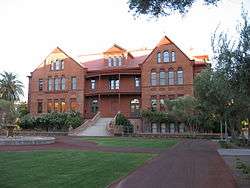 the Old Main building.
the Old Main building.- Photo of the north west side of the Agave Hall building at Barrett, The Honors College.
- Photo of the south side of the Honors Hall building at Barrett, The Honors College.
- Photo of the east side of the Juniper Hall (left) Rosewood Hall (right) and the connecting bridge along Rural Road at Barrett, The Honors College.
- Photo of the south side of the Agave Hall (right) building at Barrett, The Honors College and Jojoba Hall (left) building at the Hassayampa Academic Village.
- Photo of the north side of the Vista Del Sol towers and the Paseo Exchange along Apache Boulevard.
 Photo of the street entrance on the north side of the Chuparosa Hall building at the Hassayampa Academic Village.
Photo of the street entrance on the north side of the Chuparosa Hall building at the Hassayampa Academic Village. Photo of the north side of the Acacia Hall building at the Hassayampa Academic Village.
Photo of the north side of the Acacia Hall building at the Hassayampa Academic Village. Photo of the south east side of the Interdisciplinary Science and Technology Building I.
Photo of the south east side of the Interdisciplinary Science and Technology Building I. Photo of the south east side of the Interdisciplinary Science and Technology Building 2.
Photo of the south east side of the Interdisciplinary Science and Technology Building 2. Photo of the south east side of the Lattie F. Coor Hall building.
Photo of the south east side of the Lattie F. Coor Hall building. Photo of the east side of the Biodesign Institute building.
Photo of the east side of the Biodesign Institute building.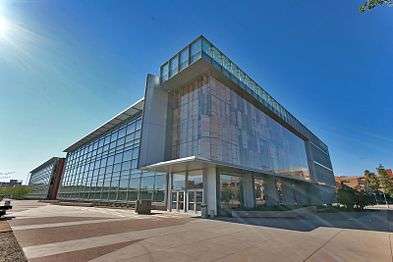 the main entrance to the Biodesign Institute building.
the main entrance to the Biodesign Institute building. Photo of the south side of the Ross-Blakley Law Library building.
Photo of the south side of the Ross-Blakley Law Library building. Photo of the south west side of the Combined Heat and Power Facility.
Photo of the south west side of the Combined Heat and Power Facility. Photo of the south west side of The Fulton Center (ASU Foundation building).
Photo of the south west side of The Fulton Center (ASU Foundation building).- Gammage Auditorium located in the south west part of campus.
 the main library on campus is the Hayden Library which is mostly located underground.
the main library on campus is the Hayden Library which is mostly located underground.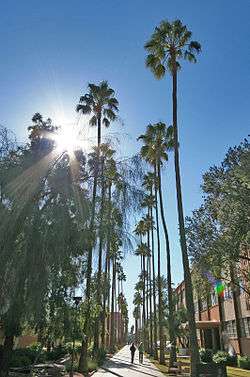 Palm Walk is the main pedestrian route going through the middle of campus.
Palm Walk is the main pedestrian route going through the middle of campus.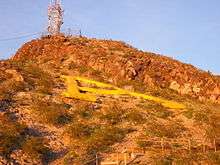 A Mountain next to campus and Sun Devil Stadium
A Mountain next to campus and Sun Devil Stadium Wells Fargo Arena home to the ASU basketball teams.
Wells Fargo Arena home to the ASU basketball teams.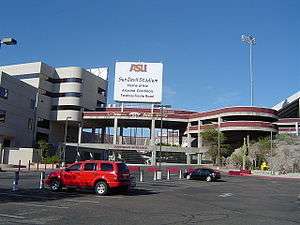 Sun Devil Stadium home to the ASU football team.
Sun Devil Stadium home to the ASU football team.- School of Music at ASU Tempe campus
References
- ↑ "Quick Facts Spring 2009" (PDF). Arizona State University Office of Institutional Analysis. 2009. Retrieved July 21, 2009.
- ↑ This figure is summed from students whose academic majors are based on the Tempe campus—any ASU student may be enrolled in classes on any of the four campuses simultaneously.
- ↑ ASU University Office of Institutional Analysis. September 24, 2008
- ↑ ASU's Tempe campus
- ↑ Arizona Arboretums And Botanical Gardens Archived August 23, 2014, at the Wayback Machine.
- ↑ "Big Ten". Public Art Review. 17 (2): 24–5. Spring–Summer 2006. ISSN 1040-211X.
- ↑ "Archived copy" (PDF). Archived from the original (PDF) on March 26, 2009. Retrieved July 22, 2009.
- ↑ Arizona State University: Virtual Tour Archived December 31, 2007, at the Wayback Machine.
- ↑ List of ASU Colleges
| Wikimedia Commons has media related to Arizona State University at the Tempe campus. |